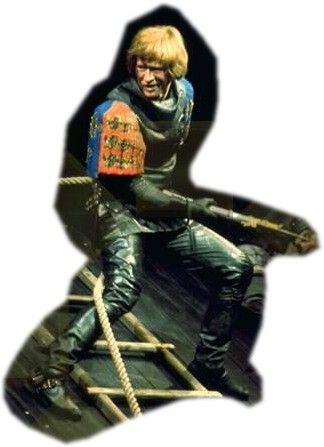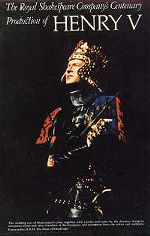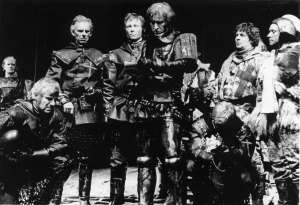
The King as Iconoclast
|
Word first came last Spring from Stratford-upon-Avon of the Royal
Shakespeare Company's triumphant centenary production of Henry V. "No
words could convey its splendour," said the London Times, and the Observer
declared it simply and solely "extraordinary."
Now the company has winged over from the Sceptred Isle to
Brooklyn's Academy of Music to give New Yorkers a three-week look at this
heralded production and the newest star in the company's already-crowded crown,
Alan Howard, who plays the title role.
For a decade, 38-year-old Howard has been regarded as a renegade
actor, complicated, quick-tempered, greatly gifted, reknowned for doing
off-beat things like his bisexual Achilles in Troilus and Cressida and
the dual role of Theseus-Oberon in Peter Brook's production of A Midsummer
Night's Dream.
But nothing he has ever done previously could possibly measure up
to his Henry (in England he also did Henry IV, Parts I and II), in which
he has emerged as a full-fledged mature talent. Without pause, Henry V's
director, Terry Hands, tells you, "I think Alan is unquestionably the best
actor of his age in England. He's one of the few who has both physical and
mental coordination combined with a voice which is capable of tackling the
great roles. Let's put it this way: he's the next Olivier. |
 |
"In our country there have been two previous Henry V's of contemporary
note, Olivier's filmed Henry (released in 1945) which was a hero king without
doubt, without uncertainty and in a sense without soul. He never explored it
because he never had to, the lines had been cut from the text. The other was
Ian Holm in 1964, who played him as an anti-war king who fought his battles
because he had to. What Alan does is to combine the warrior king with the
questioning thinker and then add a third quality, the vulnerable human being,
the man fighting to cope with the role that's been thrust upon him."
And coping was just what one found Howard doing late last Monday
afternoon as he sat in the Park Ave. offices of Paul A. Lepercq, chairman of
the Brooklyn Academy of Music.
Plagued by jet lag and wine with lunch, Howard's broad, spacious face
was sunburned from a recent holiday in Greece and his garb (T-shirt, sandals,
rolled up trousers) seemed ideally suited for the 90-degree weather outside.
There have been five generations of actors in the Howard family, Alan's father,
Arthur and his mother, who hails from the Compton Mackenzie clan, and of
course, his famous uncle Leslie, whom some critics feel Alan resembles.
He readily shrugs off any comparisons. "Uncle Leslie," he says somewhat
satirically, "I really never knew him. He was a lot older than my father and
usually only showed up at family functions. Anyway I think his style of acting
was totally different from mine. I know a lot of people say it is like mine,
but it is not. I'm a much more reckless actor than he ever was and, well, I've
done much more Shakespeare than he ever did.
"In the beginning, you see, my parents were very much against my
becoming an actor, because they didn't have a very easy time earning a living
in the theater. I made my debut at 13 at public school in Sussex as Celia in
As You Like It, and I didn't like it at all. I had a man director that
stood at the end of the hall and kept yelling, 'I can't hear you! I can't hear
you!' I hated it."
But there were more pleasant acting experiences for Alan, who at 20,
finally decided on a theatrical career.
He worked on and off in the theater for several years until 1966, when
the Royal Shakespeare Company invited him to join. Since his acting has always
been individualistic, how did he approach the part of Henry V?
Pushing his fingers through his hair, knitting his eyebrows, he sighed.
"Oh, gosh, that's a difficult question." Pause. "I think in a curious way
Shakespeare defies approach in the way other mortal playwrights do not. There
are so many ambiguities and misconceptions that just one approach is
impossible. As an actor, you should be allowed to approach the lines of
Shakespeare individually, not conceptually. I think the great academics have
inhibited so many actors that they just turn away from Shakespeare. They feel
Oh God, every line here means something, and they are just overwhelmed. Also I
wish teachers would allow school children to have a more natural reaction to
Shakespeare's text instead of stuffing interpretation down their throats. You
see, I don't feel Shakespeare is as hard as he's made out to be."
|
Howard is here with Sally Beauman, a writer, who recently
published "Henry V" (Pergamon Press-British Book Centre), an account of
the Royal Shakespeare production, and their 17-month-old son, James. He
confessed playing for American audiences fascinates him. "They're all so
different because you have such a mighty continent," he said. "Eastern
audiences are the best because they're so responsive. Our audiences at
Stratford-upon-Avon are very staid. On the other hand, when we toured A
Midsummer Night's Dream to Los Angeles, we were a bit thrown by the
reception we got. Audiences out there seemed dutiful. I think it has something
to do with the Los Angeles Music Center being a subscription audience, with the
tickets mailed to the subscribers; they all come in their cars, which are
parked in the bowels of the theater. They then ride on an escalator, where they
are met by ushers who seat them. It's all such a hermetically-sealed
experience. I wonder what the purpose of going to the theater out in Los
Angeles is.
"I know going to the theater in New York or London is a hassle.
You can never find a bloody parking space, getting the tickets is tough and you
usually arrive angry and sweating. Yet it's as if the scab has been taken off
and in a way you're open to infection. If a play is good, it takes, if it's
not, you're made more angry, but at least the experience has an affect on you.
But the obsession with these large cultural complexes striving to make us, the
public, happy is not altogether right, I don't think." |
 |
Though he's done some television and some film bits (the most recent was
a flash in Royal Flash), for the past 10 years Howard seemed more than
content spending most of his time at the Royal Shakespeare Company's
headquarters either in London or Stratford.
Evenly, he explained, "In a company like this there are opportunities
for one to do one's work as an actor. Recently I did some television and I find
British television a very odd medium at the moment. Earlier I used to think
there were some possibilities in its newness. Those seem to have vanished. What
worries me most about television in my country is that I don't think it is
developed as an art form."
|
And films? "Maybe," he said. "If only one could finance and work
with a small group of people. If there was any way one could make a very
modestly budgeted film, it would appeal to me enormously because it's in a
medium I know very little about.
"But the trouble with films in general is the problem of money.
One has to be very careful about what one is paid because ultimately your
territory is being handed over. In films you're paid so much bloody money your
silence is bought which can be a dilemma for one who thinks of oneself as an
artist." |
 |
The Sunday News, 25.4.76.
Bernard Carragher.
(M.H.)


